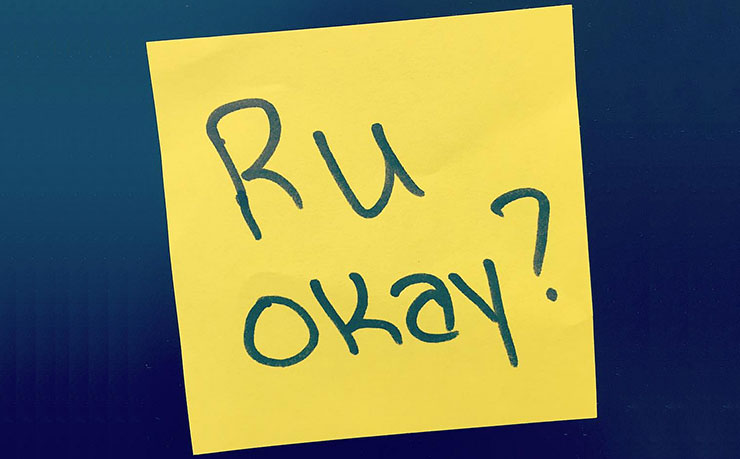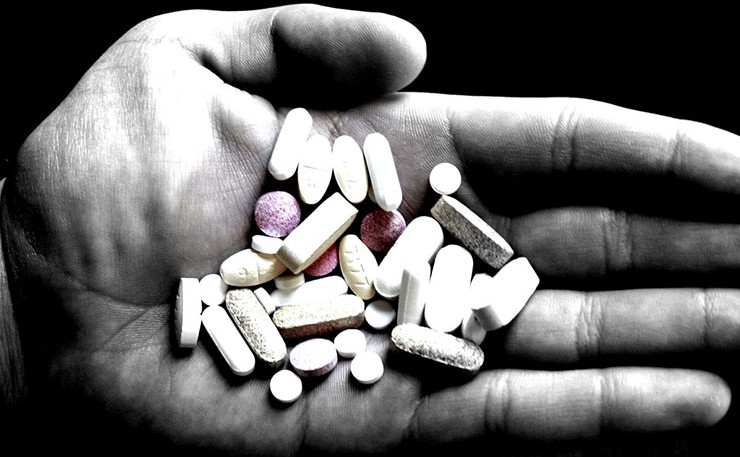Not everyone wants to be asked if they’re okay. Joshua Dabelstein explains, and a warning to readers… while he’s a brilliant writer, he’s got a bit of a potty mouth.
This week was RUOK Day again.
I was just accosted by a smiling young woman who, after experiencing ‘travel anxiety’ on a holiday in between her undergraduate and her masters degrees at USYD, has joined the campaign.
It got me feeling feelings, and then those feelings led to thinkings, and now my thinkings are going to become writings in the hope that by the time I hit the sack this whole thing has coalesced into a puddle of meaning that I can learn from.
On that front… tokenistic gestures to mental health issues are causing more harm than good.
For every RUOK day you celebrate, countless young people are coaxed onto a path of pill-paved chemical-adulteration.
We must distinguish between mental health and mental illness if we want to build campaigns that have the capacity to do more good than harm.
Access to labels of anxiety and depression are free and fast. Many peers have walked out of university doctors’ clinics, and local GPs practices, with scripts for drugs that they identify by brand names, not knowing that ‘Eleva’ and ‘Pfizer’ are not actually the names of the antidepressants that they’ve been prescribed.
There is significant therapeutic value in having an issue identified, and then subsequently treated. I work in horticulture, and I see the interactions I have with clients as to the diagnoses, prognoses, and treatment plans for plants and gardens in strife that mirror interactions with doctors regarding mental health issues.
I cannot and will not name friends who have been incorrectly taking their meds without appreciating how this affects basics like sleep, and appetite, and libido, and alcohol/black market drug use. It’s not their fault that a celebratory blanket has been draped over the shoulders of sufferers.
But judging solely from what I’ve seen first hand, we are treating mental health related drugs with a degree of smiling and carefree malaise I daresay exists as a result of the normalisation of these issues by campaigns like RUOK Day.
The problem is, if the Fiddle Leaf Ficus doesn’t shake root rot it can be replaced. When you can’t treat the curl grub in your veggie patch with Confidor you can just rip out those brassicas and replace them with summer loving edibles!
You can’t do this with your own brain.

Un-alterable changes to your chemistry, and experiences sculpted by these chemical reactions which bolster your new sense of self subsequent to a fresh diagnosis in the wake of a break-up or a shit exam period, are things you will carry with you for the rest of your life.
10 years ago I was taken to a handful of ‘educational psychologists’. At least two of them were shmucks, three of four never followed up, and all four gave me an array of diagnoses and then subsequently charged my poor mother far too much money. I was teetering on 17-years-old with prescriptions for sertraline, dexamphetamine, stilnox, and melatonin. These were to treat clinical depression, ADHD, and insomnia all at the same time.
To this day I still tutor English to boys from the high school I went to once a week, and I maintain that making boys read about the holocaust while the sun is screaming ‘COME KICK A BALL AND CHASE BUTTERFLIES’ is not easy.
I’m 26 now and I’m still a drug addict, but because I’m on the good drugs — labelled, sometimes subsidised, always washed down under a total eclipse of the soul by existential dread — it’s all okay.
And I look at the RUOK hashtaggers projecting digital empathy beams out into the nothingsphere, and my eyes pink up and leak the salty stuff.
I can’t tell if it’s the drugs, or not-enough-drugs, or whether I’m just a complete fucking asshole, but why is nobody else concerned about how over-diagnosis and over-prescription of mood altering drugs developed by international pharmaceutical companies – one of which my mother works for – and how this has affected our acceptance of mental illness?
Mental illness can’t be something we celebrate! The ‘spreading (of) awareness’ does not spread acceptance, it spreads normalisation, and by normalising mental illness we commit ourselves to furthering complacency towards the biggest killer of young Australians today.
We can’t just make a facebook status and pretend it to be the anti-trigger!
RUOK Day is a terrible idea. Its perpetrators normalize a struggle that is part of my every thought and movement. Imagine if Noel Pearson put a stall up on King St Newtown with a banner that read ‘R U DANCING FOR WHITEY YET?’
Those of us who suffer through mental illness every day — those of us who have struggled with employment, and with relationships, and with addiction, and with suicide — suffer at the hands of the smiling purveyors of social awareness betrothal when it comes to mental illness.
Mental health is one thing, mental illness is another. Without understanding this distinction it is easy to fall into the thought trap that ‘spreading awareness’ is always a good and helpful thing to do.
If you get diarrhoea from time to time when you get nervous, you don’t have anxiety. You don’t have a ‘bad gut’. You just sometimes get diarrhoea. And yes, UROK.
But some of us aren’t, and need real help, and the last thing we need is to be triggered by some smiling cunt at a train station who once took valium for ‘travel-anxiety’.
ED’S NOTE: New Matilda recognises that mental health, mental illness and issues of diagnosis and medication are complex and highly individual. We are aware that over-diagnosis and over-prescription are important controversies in contemporary psychology and psychiatry. The chair of the task force behind the Diagnostic and Statistical Manual IV (DSM-IV), for instance, Psychiatrist Dr Allen Frances, has spoken and written widely about the problematic explosion of over-diagnosis, the medicalisation of life and the powerful influence of the pharmaceutical industry.
At the same time, we note that for many people medication is vital, helpful and important. We are also aware that successful help and recovery can take time and patience. We encourage readers to talk to their treating professionals about any problems they may be experiencing with their mental health treatment, medication or otherwise.
We also recognise the importance of reaching out to those in need, and fully support asking ‘are you OK?’ in a genuine, non-tokenistic, way. On more than one day a year.
Donate To New Matilda
New Matilda is a small, independent media outlet. We survive through reader contributions, and never losing a lawsuit. If you got something from this article, giving something back helps us to continue speaking truth to power. Every little bit counts.





